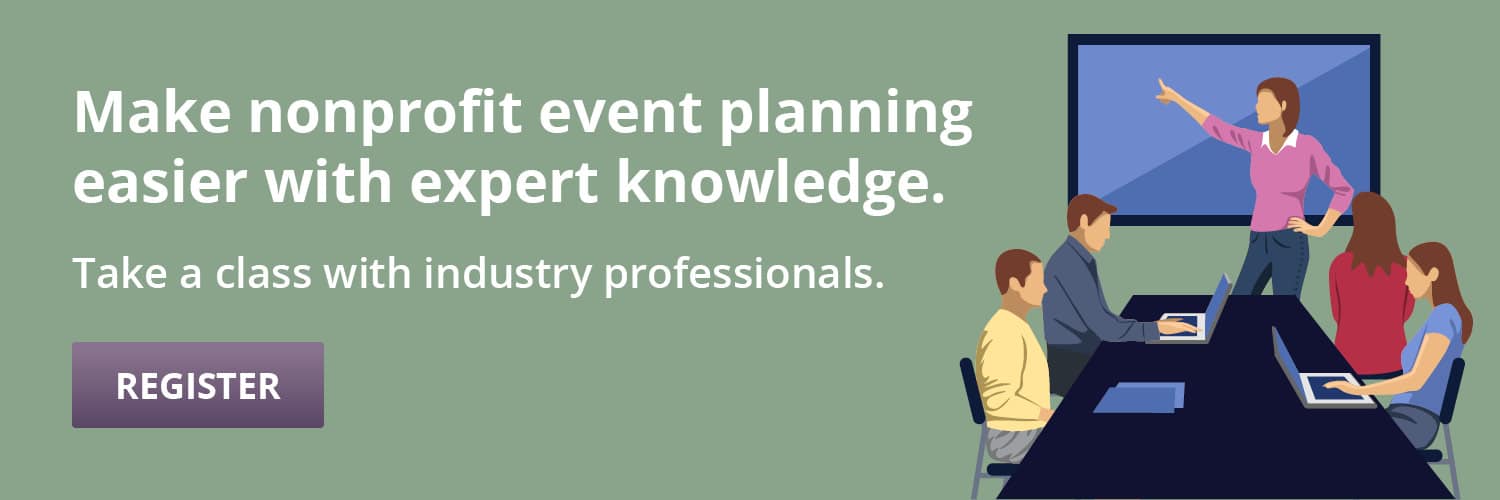Events are a staple of every nonprofit organization, as they allow them to generate excitement and form the necessary connections to fulfill their mission. However, planning an entire event can be a daunting task. There are many different factors to consider and decisions to make about the event type, budget, date, venue, and more. To help you elevate your nonprofit event planning process, this guide will go over the following topics:
- Why are nonprofit events important?
- What are the benefits of nonprofit event planning?
- 10 Steps to Nonprofit Event Planning
- 3 Tips to Elevate Your Nonprofit Event Planning
Regardless of the size of your nonprofit, we’re here to help you gain the necessary knowledge to plan and host the perfect event and push your mission forward. Let’s get started! 
Why are nonprofit events important?
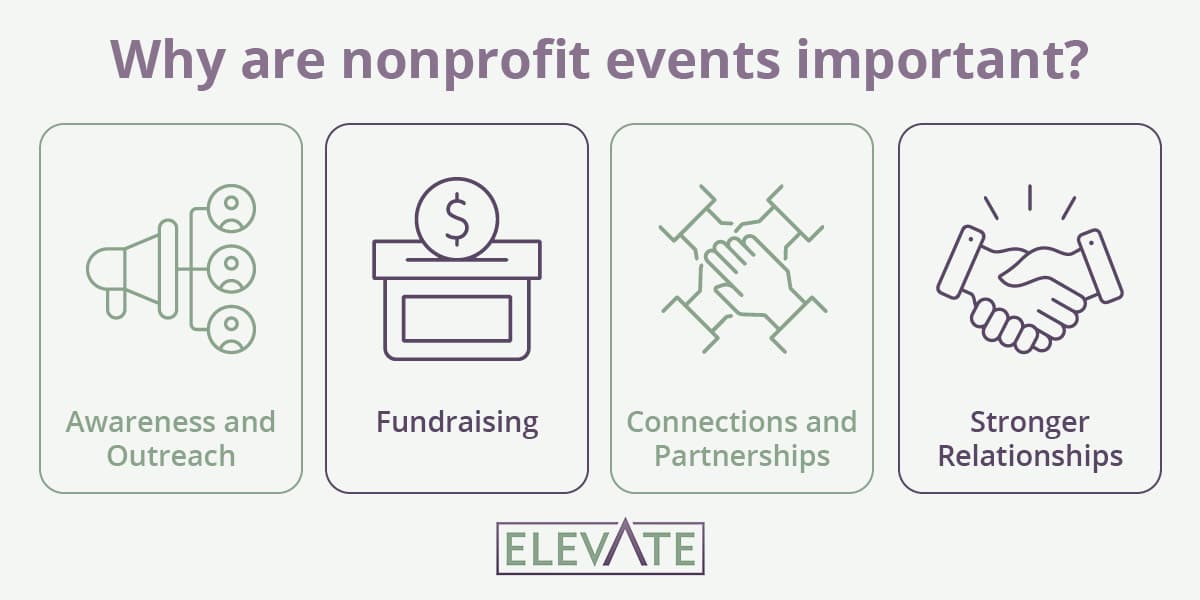
- Awareness and outreach. As you promote your nonprofit event, you’ll also be promoting your nonprofit’s initiatives. This leads to an increase in awareness of your work. Plus, if you’re hosting a larger event, you may even receive media attention, resulting in even greater exposure and outreach.
- Fundraising. One of the main reasons why nonprofits organize events is to help them hit their fundraising goals. By focusing on compelling storytelling and creating a connection between your nonprofit and its supporters, you’ll be able to leverage your events as concentrated fundraising opportunities.
- New connections and partnerships. Whether you’re soliciting corporate partnerships or trying to connect with a major donor, nonprofit events are vehicles for your organization to form and strengthen connections and partnerships.
- Stronger relationships. Aside from connecting with new donors and sponsors, events give you the chance to strengthen your relationships with existing supporters, donors, and sponsors. If you’ve had a successful partnership with a major donor or sponsor previously, don’t be afraid to reach out to solidify that connection.
Above all else, nonprofit events allow you to build a community of like-minded individuals. By elevating your event with a thorough plan, you’ll be able to create an impact by uniting hundreds of individuals, all dedicated to supporting your mission.
What are the benefits of nonprofit event planning?
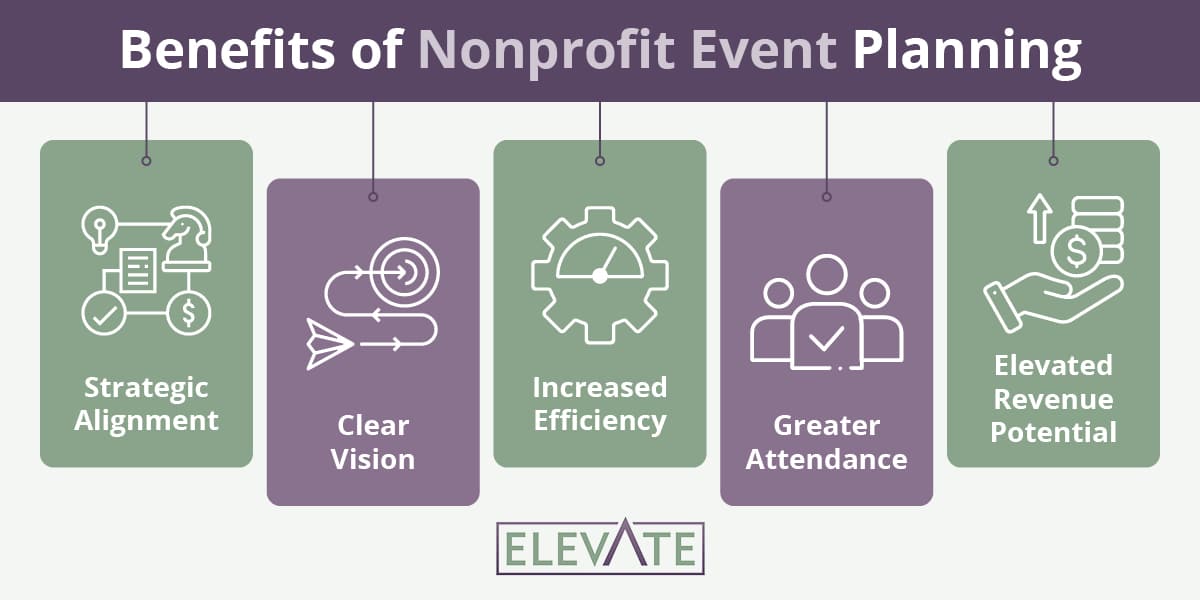
- Strategic alignment. With event planning, you’ll be able to align your event with your nonprofit’s overall strategy. This ensures that you’ll send a cohesive message that includes your mission, values, and long-term plans.
- Clear vision. By laying out the details of your event in advance, you’ll have a clear vision of what it will look like and how it will serve your nonprofit’s mission. That will help your staff members get on the same page about your event and its purpose.
- Increased efficiency. Thorough nonprofit event planning results in a comprehensive to-do list. This increases your efficiency during the event preparation stages, as you’ll have a clear idea of the tasks you need to complete to host a great event.
- Greater attendance. Planning well in advance means that you’ll be able to send out event promotion materials earlier. Potential attendees will learn of your event and commit to attending, resulting in increased attendance.
- Elevated revenue potential. Your nonprofit event plan should include a clear budget and revenue goals. With that information in mind, you’ll have more defined asks when engaging prospective sponsors and major donors. This elevates your potential for generating revenue, as your solicitation targets will appreciate a more concrete ask.
Regardless of if you’re an experienced nonprofit event planner or if it’s your first time, you can benefit from creating an event plan. Don’t be afraid to spend time and energy on your plan, as it will help streamline your process and result in a greater return on investment. To help you save time during event planning, consider creating a standardized event plan template. That way, your planning process will be more consistent and comprehensive. Plus, you’ll be less likely to let the little details slip through the cracks, as your template will remind you to address them.
10 Steps to Nonprofit Event Planning
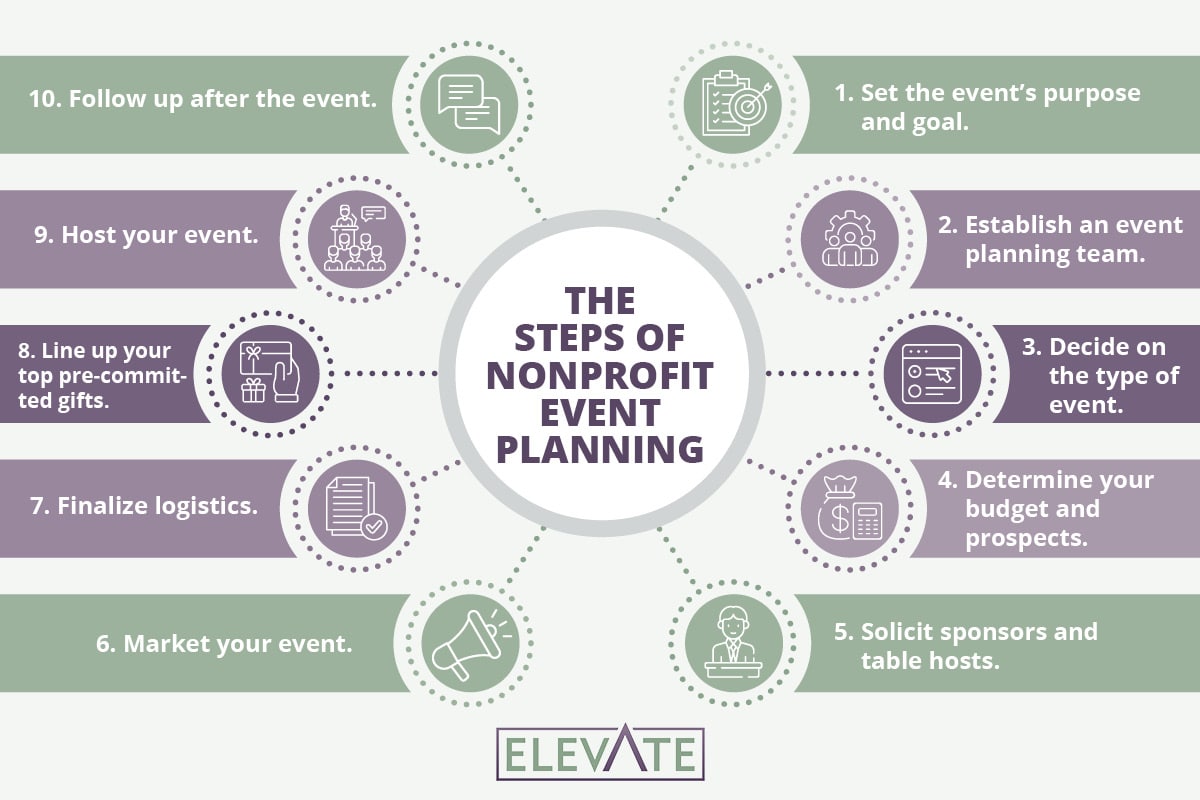
1. Set the event’s purpose and goal.
Before you can get down to the nitty-gritty of event planning, you need to first establish your event’s purpose. Ask yourself: What do you hope to accomplish with this event and how will that help your nonprofit’s mission? What impact can you create by bringing together your supporters? What do you want them to be thinking of when they leave? Some common nonprofit event purposes include:
- Increasing awareness of your mission
- Generating revenue
- Recruiting new supporters
- Building relationships with existing supporters
- Celebrating a milestone
After you’ve decided on the event’s purpose, formulate your goals for the event around this purpose. Make sure that they are SMART—specific, measurable, achievable, relevant, and time-bound—to increase your chances of success. Remember to identify key performance indicators and metrics to measure whether you’ve achieved your goal or not at the end of the event.
2. Establish an event planning team.
Since event planning is fairly involved, establish a dedicated nonprofit event planning team that will handle everything related to your event. As you create this team, recruit individuals with the necessary experience and knowledge to maximize your event’s impact. Aside from your organization’s staff, these individuals can be key volunteers or board members.
3. Decide on the type of event.
One of the most exciting choices you’ll have to make is deciding on what type of event you’ll host. Make sure to choose an event model that is tailored to your event’s purpose. For example, if your goal is to acquire new donors, then you might consider a breakfast or lunch acquisition event that’s free to attend. On the other hand, if your goal is to engage major donors, then we suggest a major donor signature event that allows guests to bring friends and engage in fun and celebration, such as a gala. To elevate your nonprofit’s event, consider hosting it virtually or using a hybrid format. Due to their remote nature, these events are more accessible to attendees and allow you to reach a larger audience. Plus, they are more cost-effective, as you won’t need to book a large venue or pay for catering.
4. Determine your budget and prospects.
Assess the funds you’re able to allocate to this event and how much money you’ll need to ensure the event is a success. Although many event planners focus on expenses when developing their budget, a solid nonprofit event plan will also lay out a strategy for revenue goals. As you construct your plan, account for your revenue channels and outline specific prospects you can contact to reach your fundraising goal. For example, if you know that you need a major donor or sponsor to give $50,000 to reach your goals, then the budget section of your plan should lay out a few ideas for individuals and companies you should contact.
5. Solicit sponsors and table hosts.
To host a successful event that fulfills your goals, you may need to recruit additional help. Two groups that are worth recruiting because of their capacity to make an impact on your event are sponsors and table hosts. Most commonly, nonprofits seek sponsors to increase their budget for their event or to ensure that they meet their fundraising goal. To incentivize businesses and corporations to invest their funds in your nonprofit, you’ll need to offer them some type of benefit in exchange for their partnership. For example, you can:
- Add your sponsor’s logo on event promotional materials
- Feature your sponsor’s product prominently at your event
- Shoutout your sponsor’s generosity on social media
- Give your sponsor access to a VIP event
- Thank your sponsor in your speech at the end of your event
Aside from sponsors, table hosts can also make a significant impact on your event’s success. These individuals are tasked with securing attendees for your event, which increases your fundraising capacity. Additionally, your table hosts will be expected to lead by example and make a gift to your nonprofit. When recruiting table hosts, you’ll want to target supporters who have proven their dedication to your nonprofit. These individuals may be recurring donors, major donors, repeat volunteers, board members, or other longtime supporters. These individuals will be excited to discuss their support of your nonprofit and will be happy to make a gift in your support.
6. Market your event.
At this point, all of the event details should be nailed down. To ensure that you have attendees, you’ll need to promote your event to donors, supporters, and the general public. We recommend that every potential attendee has 7-10 touches in print and digital formats to encourage them to attend. Some promotional materials you might prepare for your event include:
- An event page
- Save the date postcards
- Mailed print invitations
- Flyers and posters
- Social media posts
- Email newsletters
- Event teaser videos
- Event reminder texts
- Media press releases
- Event program
While many people advise foregoing printed promotional materials and converting entirely to digital, we’ve found that using both types of materials is actually more conducive to success. With digital materials, you’re able to generate buzz and increase awareness, and with print materials, you’ll be able to incite action and increase the number of attendees. If you’re feeling intimidated by event marketing, consider expert help in the form of event consultants. These professionals can not only aid in your nonprofit event planning process, but they can also help you discover the best way to tell your organization’s story. They’ll ensure that your marketing materials are consistent and compelling. Plus, they’re able to assist in other ways, such as helping you navigate software systems and giving platforms. And, they’re able to train your staff members to get them up to speed on best practices.
7. Finalize logistics.
After you’ve outlined the big-picture aspects of your event, it’s time to finalize all of the details about your event. At this stage, you should have a clear picture of what your event will look like and how it will help you fulfill your goals. Some event details that should be in your plan include:
- Date
- Location
- Theme
- Decorations
- Food and drinks
- Roles for volunteers and staff
- Extra activities
During this stage of nonprofit event planning, you have the opportunity to set your event apart from similar nonprofit events. Feel free to get creative and don’t be scared to try something new.
8. Line up your top pre-committed gifts.
To ensure maximum fundraising for your event, solicit donations and gifts ahead of time. Before your event, ask key major donors, previous donors, and board members to commit to a level of giving during your event. Don’t be afraid to contact supporters who are unable to attend the event as well, as they may still want to make a gift. Just make sure that you still show appreciation for their contributions! As your event approaches, be sure to check in with donors who are making pre-committed gifts to secure their support and maximize fundraising for your event. This will also give you a clearer idea of how much you’ll need to raise during the event to meet your goals.
9. Host your event.
On the day of the event, focus on providing a great guest experience to your attendees. A positive experience with your nonprofit will lead supporters to increase their giving and invest long-term in your mission. So show your appreciation for your attendees and the gifts you receive to make them feel good about supporting your nonprofit.
10. Follow up after the event.
Although your event may be over, your work isn’t done yet. By hosting your nonprofit event, you’ll probably have acquired many gifts and formed new relationships. Steward these new relationships by thanking them for their attendance and letting them know how else they can get involved with your nonprofit. For major donors and sponsors, don’t be afraid to include a gift with your thank-you messages, such as merchandise branded to your nonprofit. Aside from stewarding new relationships, you can also ask your attendees to provide feedback on how the event went. For example, send out a survey asking attendees what they enjoyed most about the event, what they thought could have been improved, and what they’d like to see from your nonprofit in the future. Then, assess the responses you receive to gain insight into how you can improve your events in the future.
3 Tips to Elevate Your Nonprofit Event Planning
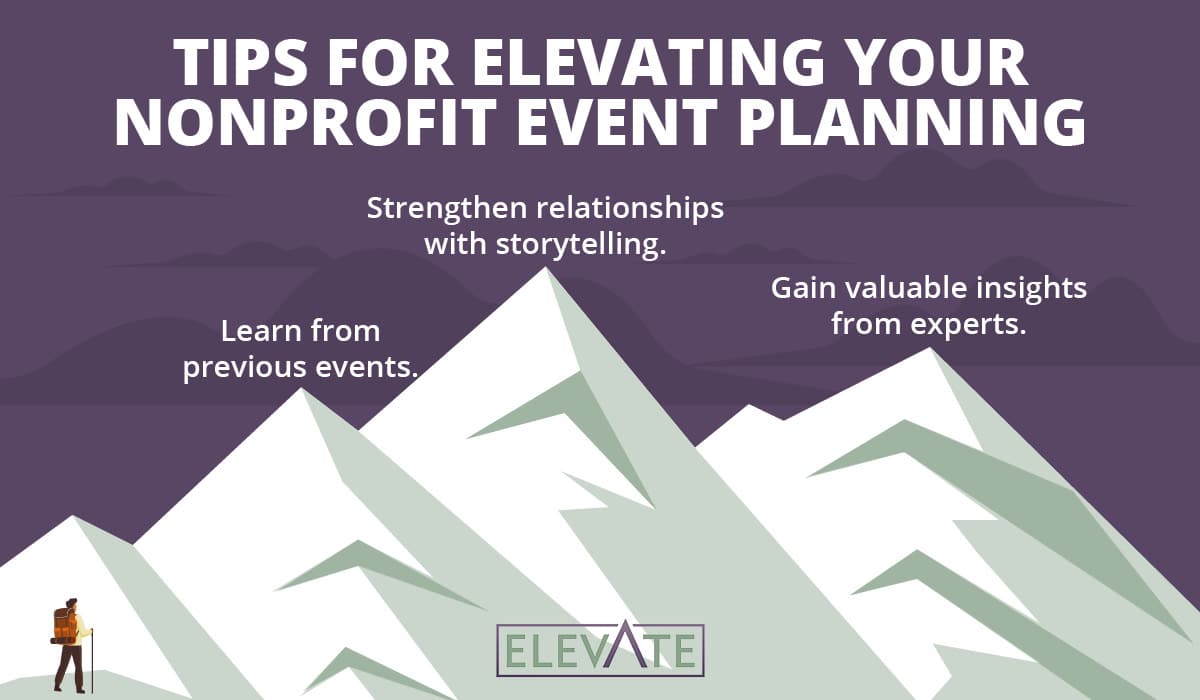
1. Learn from your previous events.
Every event that your nonprofit hosts is an opportunity for your organization to learn and grow. While you should be doing your best to hit your goals for every event, if you fall short, then you have a valuable chance to reflect on what you can do better. To help you learn from your previous events, you should:
- Review your goals
- Identify successes and challenges
- Ask for attendee feedback
- Analyze data
After an event has been wrapped up, host a debrief meeting with your event team. During this meeting, go over all of the insights you’ve gained and brainstorm ways to improve your future events with this knowledge. For example, if the data shows that you have a low conversion rate with emailed event invitations, adjust your email templates to help you acquire more registrations for future events. Or, if attendees express that they enjoyed having live entertainment at your event, continue that with future events.
2. Strengthen relationships with storytelling.
One of the ways you can truly solidify connections with your supporters is by making your nonprofit’s narrative more compelling with storytelling elements. With storytelling, you’ll be able to share authentic anecdotes that help you foster trust with your audience and create a stronger emotional connection. When deciding on which stories to tell, consider the following questions:
- Do they show the impact of your nonprofit?
- Do they humanize your mission by showing and amplifying the people behind your cause?
- Are they relatable to your audience in some way?
- Do they show your audience that their support results in positive change?
Create a collection of powerful stories that you can utilize. When planning your nonprofit’s event, be sure to weave storytelling throughout your planning process. For example, as you determine the big-picture details, consider how they relate to your nonprofit’s story. When you get to the nitty-gritty details, ensure that they line up with the story you’ve chosen to tell. Incorporate your story into your promotional materials and throughout the event itself. You can use visual elements such as photos and videos to create a more engaging and emotional experience for supporters, compelling them to attend your event and make gifts to your nonprofit.
3. Gain valuable insights from industry experts.
Sometimes, the best thing you can do for your nonprofit event is to learn from industry experts. Their years of experience results in invaluable advice and tried-and-true strategies that your organization can leverage to improve your events. Some ways to gain access to expert knowledge on nonprofit event planning include:
- Books
- Podcasts
- Blogs
- Webinars
- Conferences
- Consultants
- Panels
For example, if you’re struggling with connecting to major donors, you could consider purchasing a book that will guide you through tried-and-true strategies. Or, if you’re looking for advice on whether a virtual or in-person event format will work best for your nonprofit, consider getting a consultant’s opinion.
Aside from these options, some fundraising experts will host classes on a variety of nonprofit-related topics. You can sign up for these classes for the opportunity to learn directly from an expert and even have the opportunity to pick their brain with specific questions.
Additional Resources
Nonprofit event planning may seem daunting at first, but as you get familiar with it, you’ll find that everything can be broken down into smaller steps during the process. Be thorough with your planning and give yourself a generous timeline to allow you to cover all your bases and ensure that everything will run smoothly. If you’re interested in learning more about nonprofit topics, check out the resources below:
- Level Up Your Fundraising: 10 Best Fundraising Books to Read — Much like other books, nonprofit fundraising books contain a wealth of expert information that your organization can utilize. This guide lists the top fundraising books we recommend you add to your reading list.
- 10 Inspiring Nonprofit Conferences Your Team Should Attend — If you’re interested in learning more about event planning and networking with other like-minded individuals, try attending a conference! Check out our list of the top conferences your team should register for.
- Elevate Conference — Nonprofit conferences provide a valuable opportunity to network with other nonprofit professionals while learning about industry trends from experts. If you’re interested in attending one, check out the Elevate Conference.



